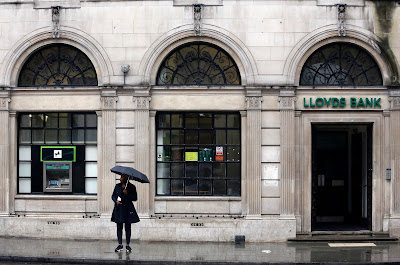Lloyds Bank and the PPI Scandal: The Premature ‘Out of the Woods’ Rhetoric
Today’s very short post focuses
upon the news that the Financial Conduct Authority (FCA) has recently extended
the deadline to claim compensation for mis-sold ‘Payment Protection Insurance’
(PPI). Whilst a lot of financial institutions will have to prepare to offset
the extended deadline, it is Lloyds that has grabbed the business headlines by
apportioning an extra £350 million to offset any further claims that may be
made of it – however, this comes only a week or two after the Bank posted its
best performance figures in over a decade, as was previously
discussed in Financial Regulation
Matters. This post will therefore argue that the rhetoric being advanced
recently regarding Lloyds – rhetoric like Lloyds represents ‘a modern day success story’
is wide of the mark and creates a false sense of security that we simply cannot
afford to believe in.
The ‘robust recovery’ was
heralded far and wide upon the publication of Lloyds Bank’s financial
performance for the previous financial year. However, that fervour was tethered
to a deeper understanding of Lloyds’ exposure to future penalties. Yes, pre-tax
profits were up 158% to £4.24 billion – mainly because of a reduction in PPI
provisions to the tune of £3 billion – but the bank set aside a further £1
billion to cope with other ‘conduct’ issues. The
news that Lloyds has syphoned off another £350
million, bringing its historic reserve to over £17 billion, is not
ground-breaking news simply because of the small sums involved. However, it
does show that the bank is not so far out of the water as the post-financial
result praise would have us believe.
Payment Protection Insurance is a
product that was sold alongside mortgages, credit cards, and other non-secured
loans to protect against the inability to pay. It was estimated by the
now-defunct Financial Services Authority that upwards of 53
million PPI policies were sold in total, with 45 million of these coming
from banks. Initial estimations of those affected by mis-selling were vastly
under-estimated at 3 million people, with a total of 12 million people having
received compensation by this time last year, at a total cost of £24 billion.
There is a reason for Lloyds reserving so much for PPI compensation payments,
and that is because it has been suggested that just ‘one
in five’ complaints about PPI mis-selling has been made so far, with a
recent court case only adding to the potential flow of claimants.
In line with what we already know
about the extremely poor ethical foundation of the financial elite, a number of
banks have been fined for mis-handling the PPI complaints, with Lloyds itself having
been fined £117
million by the FCA and the financial ombudsman overturning
more than 70% of the claims rejected by the Banks.
Lloyds is not out of the water yet,
and rightly so. Its conduct in one of the largest financial scandals this
country has seen outside of the Financial Crisis means that the positive
outpouring seen since the financial reports were released needs to be
reconsidered. A larger issue is that if this rhetoric becomes commonplace and
people start to believe in something that has no basis, there is every chance
that regulatory decisions will be taken that we, as a society, can ill afford.
With the Brexit decision looming and the environment being fertile for
deregulation, getting carried away with positive sentiments regarding such a
venal industry will not result in positive results. The evidence is widely
available – the banks are not out of the woods yet.





Comments
Post a Comment